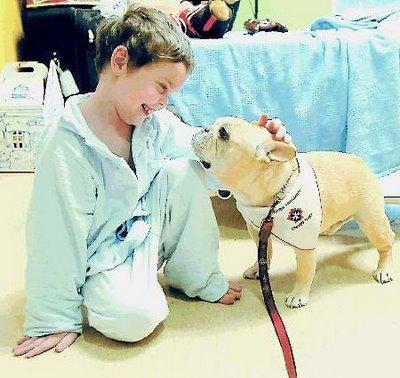 Bentley is a big dog – nearly 110 pounds of furry, tail-wagging man’s best friend.
Bentley is a big dog – nearly 110 pounds of furry, tail-wagging man’s best friend.
Or in this case, everyone’s best friend.
Owned by registered nurse Janet Myers of Seymour, Bentley, a 2-year-old Burmese Mountain dog, is a certified therapy dog at Schneck Medical Center. Walking the corridors and peeking into rooms, he brings smiles to patients and staff alike.
Little children especially take to Bentley’s gentle nature, reaching out to pet and hug him, and in many cases laughing when he performs a trick.
What the kids don’t realize is that Bentley is doing his job, making them feel better and less worried about being in a hospital.
He has been trained by Myers to respond to different patients in different situations.
“The number one skill is they have to love people,” she said of therapy dogs. “They also have to be intuitive because they have to figure out what each person needs.”
To help tell their story and explain how pet therapy works, Myers and Bentley have published a children’s book titled “Booboos, Band-aids and Bentley: The True Story of a Hospital Therapy Dog.”
“I’ve been doing this for 12 years and I feel like we have a story to tell,” Myers said of her involvement with pet therapy.
As a registered nurse, now working as director of risk and safety at Schneck, Myers said patient care is based on evidence and that evidence proves pet therapy works.
“It’s so much more than just waving to patients,” she said. “Pet therapy can impact a patient by lowering anxiety and fear, improving their mood and can impact pain management. It has been proven that it lowers pain.”
Children especially benefit from Bentley’s service, added Myers, a former pediatric nurse.
“Every child will be impacted by health care in their life, whether it’s getting stitches or having their tonsils taken out,” Myers said. “The time to get them ready is not when they are on the stretcher but before with education.”
She hopes one day pet therapy is available everywhere.
“My dream is that any child would be offered pet therapy at any hospital,” she said.
Myers said after years of seeing pet therapy work at the bedside, she wanted to spread the word and chose to do so through words and pictures.
Inside the hardback book is page after page of heart-warming, full-color photos, taken by photographer Jamie Marshall of Marshall Memories Photography in Seymour. Each photo spread features Bentley interacting with young patients and hospital staff. Those faces may look familiar as Myers used local people to model each situation in the book.
From showing one child how to “wash our paws” to demonstrating how to stay still while the doctor performs an examination to even bringing a little girl a box of tissues, the photos capture Bentley’s ability to adapt to each child’s size and demeanor, whether small and timid or big and rambunctious.
The story is written by Myers in rhyming stanzas and is told through Bentley’s eyes.
It’s not just Myers heralding the benefits of pet therapy, as many other professionals agree it is a positive, cost-effective way to deliver care to patients.
Myers and Bentley have been featured in many professional nursing and health care magazines and have been invited to give presentations about pet therapy at medical and health care conferences.
Just recently, they attended one in Orlando, Fla., where Bentley was just as popular with the crowds as Mickey Mouse.
“Everyone wanted their picture taken with him,” Myers said.
Dr. Courtney Kleber, a pediatrician at Seymour Pediatrics, says there’s no doubt that pet therapy works.
“A child’s hospital stay can be very stressful,” she said. “Pediatricians and staff try to relieve anxiety, fear and pain through various techniques. No intervention, however, seems to work as quickly or effectively as an intuitive therapy dog.
“I’ve observed Bentley’s calming, comforting effect on young patients and their families many times,” Kleber added.
Pet therapy, Myers added, “is so simple, but so effective,” and by having it available at Schneck, patients are being put first.
“This book demonstrates the caring spirit and patient-first culture of our hospital,” she said.
Recently, Myers held a “red-carpet” book release party, inviting all those who helped turn the book from a dream into a reality.
Each child received a free copy of the book and a stuffed miniature Bentley as a thanks for their participation.
“We wanted to recognize all the people that helped Bentley and I tell our story,” Myers said.
There were 34 children, one family with a newborn baby, one elderly woman and four hospital employees photographed for the book.
“Booboos, Band-aids and Bentley” isn’t Myers’ first foray into publishing. She and her original therapy dog, Maggie, Bentley’s sister who died, released a book called “The Visit: Healing Moments in Pet Therapy,” which shows the dog visiting patients at their bedsides.
The books are available to purchase at Bevers Family Pharmacy in Seymour and Family Drug in Brownstown or online at bentleythetherapydog.com.
A portion of the sale of each book will go to the Berner-Guarde Foundation for research into the short lifespans of Burmese Mountain dogs.
